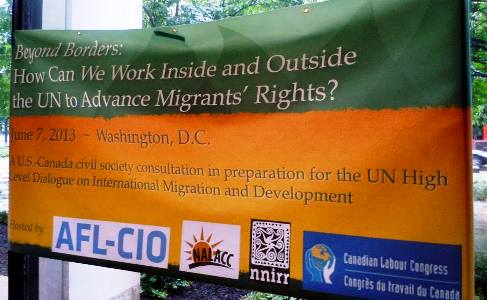The National Network has long played an active role in international migrants’ rights advocacy and organizing. NNIRR was a founding member in the early 1990’s of Migrants Rights International, (MRI) a global network of migrant rights organizations and has continued to work to strengthen the voice and role of migrants in the international arena that grew into what is now the Global Coalition on Migration, a multi-sector alliance. NNIRR is also a founding and active member of the Women in Migration Network, an international alliance focusing on lifting up gender analyses and positions in global migration.
In 2020, NNIRR became a member of the Bloque Latinoamericano, and has been working with grassroots members and leaders from across the Americas to advocate for the rights of migrants, and respond as a network to immediate emergencies of families in migration. Bloque has been active in pressing the UN, International Organization for Migration, Inter-American Commission on Human Rights, to protect human rights, and address the needs of migrant communities and root causes of migration in the region.
From organizing delegations of U.S. immigrant and refugee representatives to participate in significant global events such as the UN Conference Against Racism and Xenophobia, in South Africa, to helping lead protests at the World Trade Organization ministerial meetings, to helping to organize migrant civil society intervention in the Global Forum on Migration and Development–NNIRR has served as one of the key organizers and proponents of the relevance of global justice perspectives, human rights, and the empowerment of global migrants.
NNIRR has worked tirelessly alongside partners and allies from the migrant rights and global labor movement around the world to insist on a voice for migrants, to centralize the human rights framework, address migrant abuse and injustice, advance labor protections and workers’ rights, and argue for people-centered development.
There are several particular spaces where NNIRR, U.S. allies and international partners regularly participate in our “civil society” capacities. For NNIRR, as for our key partners, lifting migrant voices, centering human rights, and ensuring gender perspectives have been important focal points of our intervention.
Here are some of the key spaces:
UN Summit on Refugees and Migrants Learn more about the high level summit in New York in 2016, designed to address the global migration and refugee crisis.
Global Forum on Migration and Development (GFMD). The most recent in person GFMD was held in Quito, Ecuador in December 2019. A virtual meeting was held in January, 2021.
Since its first convening in Brussels, Belgium, in 2007, the GFMD has become the primary annual intergovernmental forum on migration and development. The Forum seeks to address the multi-dimensional aspects, opportunities and challenges related to migration and development and to foster action-oriented outcomes. Its primary identified goals are to “streamline migration policy internationally” and “identify ways and means to maximize the development benefits of migration for sending and receiving countries, while minimizing its negative impacts.”
UN High Level Dialogue on International Migration (2013)

(This photo shows banner from US-Canada regional “consultation” held in preparation for the 2013 High Level Dialogue on Migration at the UN. Click here for a report from the gathering)
In 2013, there was no GFMD, as the UN once more convened a High Level Dialogue on International Migration and Development (HLD), on Oct. 3 & 4 at the UN in New York. NNIRR and its members participated in a variety of civil society activities in preparation for the HLD, and with global partners, helped to organize a parallel activity–the People’s Global Action on Migration, Development and Human Rights, a week-long series of workshops, plenaries, site-visits with local groups, and a labor-community march across the Brooklyn Bridge.
NNIRR Executive Director Catherine Tactaquin was selected to present on behalf of civil society, to the governments during the HLD. Her remarks can be read here.
Our approach to the HLD was two-fold:
- Organizing with partners to directly impact the governmental debate: this year we are collectively proposing a 5-year, 8-point “agenda” to governments, an agenda that includes very do-able proposals as well as actions and commitments that challenge governments and the UN process to advance key human, migrant, women and labor rights and needs. You can ready the civil society proposal here.
- Building the migrant, labor and and broad grassroots movement by actively supporting the convening of the Peoples’ Global Action on Migration, Development and Human Rights. Our members in New York are helping to organize this annual international event that has helped to shape the global migrant rights movement, strengthened key partnerships, provide an independent, alternative strategy and planning space.
U.S.-Canada Regional Consultation: In June 2013, NNIRR partnered with NALACC, AFL-CIO and the Canadian Labour Congress to host a US-Canada regional civil society consultation: “Beyond Borders: How Can we work Inside and Outside the UN to Advance Migrant Rights?” The gathering was one of seven such convenings that took place around the world, involving hundreds of organizations. Read a report from the meeting here.
UN Interactive Hearings on International Migration and Development: NNIRR members were among more than 300 participants who met in mid-July in New York in an HLD preparatory conference and participation in a one-day session at the UN between civil society and governments. Click here for a webcast of the day.
People’s Global Action on Migration, Development and Human Rights
Apart from the GFMD and the government-hosted “Civil Society Days” that have taken place every year since 2007, NNIRR and partners have organized parallel events now known as the “PGA” — the People’s Global Action on Migration, Development and Human Rights. The PGA has become a space for global migrant rights movement building — networking, strategizing, and organizing towards migrant-led initiatives at multiple levels, both short and longterm.
The National Network has also worked to bring issues to the UN Human Rights Council (HRC), the World Trade Organization (WTO), the International Labour Organisation (ILO) and other UN and inter-governmental agencies.
